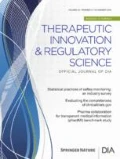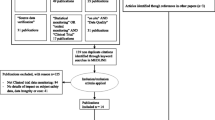Abstract
Clinical trials are designed to evaluate the efficacy, safety, or other characteristics associated with medical products. Trials are usually complex and require a large group of professionals to follow a clinical trial protocol, standard operating procedures, and study-specific manuals, guidelines, and plans. Clinical trial protocols prospectively describe the background and rationale for conducting the trial, the objectives of the trial, the trial design, the equipment to be used, the procedures to be performed, and the statistical methods on how the trial data are to be analyzed. Deviations from the protocol can result in harm to subjects, biased or inaccurate results, and possible rejection of all or part of the trial data by the sponsor or regulatory authorities. Despite preventive efforts, protocol deviations are likely to occur in most trials. This position paper proposes a common definition of protocol deviations and recommends best practices for their detection, classification, and management as part of their life cycle, with a goal of reducing their impact on subject safety and data integrity. The information contained herein is drawn globally from industry experts within the DIA Good Clinical Practice and Quality Assurance community, an industry-wide survey, and presentations with discussions at various industry meetings.
Similar content being viewed by others
References
MARC Research. Top 5 FDA warning letters for clinical investigators. http://www.imarcresearch.com/top-5-2012-download/. Accessed April 23, 2012.
US Food and Drug Administration. Inspections, compliance, enforcement, and criminal investigations: enforcement actions, warning letter. http://www.fda.gov/ICECI/EnforcementActions/WarningLetters/ucm248222.htm. Updated March 28, 2011. Accessed November 8, 2013.
US Food and Drug Administration. Inspections, compliance, enforcement, and criminal investigations: enforcement actions, warning letters. http://www.fda.gov/ICECI/EnforcementActions/WarningLetters/default.htm. Updated November 4, 2013. Accessed October 22, 2013.
Secretary’s Advisory Committee on Human Research Protections. SACHRP minutes, February 28–29, 2012. http://www.hhs.gov/ohrp/sachrp/mtgings/2012%20Feb%20Mtg/meetingminutes.pdf. Accessed October 22, 2013.
US Food and Drug Administration. CFR: Code of Federal Regulations Title 21. http://www.accessdata.fda.gov/scripts/cdrh/cfdocs/cfcfr/CFRSearch.cfm?fr=812.150. Updated April 1, 2013. Accessed October 23, 2013.
US Food and Drug Administration. Compliance program guidance manual: program 7348.811. http://www.fda.gov/downloads/ICECI/EnforcementActions/BioresearchMonitoring/UCM133773.pdf. Accessed October 23, 2013.
US Food and Drug Administration. Guidance for industry, investigator responsibilities: protecting the rights, safety, and welfare of study subjects. http://www.fda.gov/downloads/Drugs/GuidanceComplianceRegulatoryInformation/Guidances/UCM187772.pdf. Accessed October 23, 2013.
International Standards Organization. Document 14155: clinical investigation of medical devices for human subjects—good clinical practice. http://www.unil.ch/webdav/site/fbm/shared/cercfbm/ISO-14155-2011.pdf. Published February 1, 2011. Accessed October 23, 2013.
International Conference on Harmonisation of Technical Requirements for Registration of Pharmaceuticals for Human Use. E3 guideline: structure and content of clinical study reports, questions & answers. http://www.ich.org/fileadmin/Public_Web_Site/ICH_Products/Guidelines/Efficacy/E3/E3_QAs_R1_Step4.pdf. Published July 6, 2012. Accessed October 23, 2013.
International Conference on Harmonisation of Technical Requirements for Registration of Pharmaceuticals for Human Use. E3 guideline: structure and content of clinical study reports. http://www.fda.gov/downloads/RegulatoryInformation/Guidances/UCM129456.pdf. Published July 1996. Accessed October 23, 2013.
Standard Protocol Items: Recommendations for Interventional Trials (SPIRIT) statement. http://www.spirit-statement.org/. Published January 30, 2013. Accessed October 23, 2013.
Clinical Data Interchange Standards Consortium. Organizing and accelerating the clinical research process from the beginning: the CDISC protocol representation model and toolkit. http://www.cdisc.org/stuff/contentmgr/files/0/58c41a172c8dc8863083b6ea233f1a54/misc/prm_document___april_2012fin.pdf. Published April 2012. Accessed October 23, 2013.
Sprenger K, Nickerson D, Meeker-O’Connell A, Morrison BW. Quality by design in clinical trials: a collaborative pilot with FDA [published online October 25, 2012]. Drug Inf J.
Kramer MJ, Grandinetti C, Kramer JM, Morrison BW, Ball L, Sherman RE. Clinical trials: rethinking how we ensure quality. Drug Inf J. 2012;46:657.
Clinical Trials Transformation Initiative. Expert meeting summary, principles document. http://www.trialstransformation.org/what-we-do/investigational-plan/qbd-qrm/products. Accessed November 6, 2013.
US Food and Drug Administration. Guidance for industry: oversight of clinical investigations—a risk-based approach to monitoring. http://www.fda.gov/downloads/Drugs/./Guidances/UCM269919.pdf. Published August 2013. Accessed October 23, 2013.
European Medicines Agency. Reflection paper on risk based quality management in clinical trials. http://www.ema.europa.eu/docs/en_GB/document_library/Scientific_guideline/2013/11/WC500155491.pdf. Published November 18, 2013. Accessed November 28, 2013.
National Research Council of the National Academies. The prevention and treatment of missing data in clinical trials. http://www.nap.edu/openbook.php?record_id=12955&page=R1. Published 2010. Accessed October 23, 2013.
European Medicines Agency. Guideline on missing data in confirmatory clinical trials. http://www.ema.europa.eu/docs/en_GB/document_library/Scientific_guideline/2010/09/WC500096793.pdf. Published July 2, 2010. Accessed November 15, 2013.
European Medicines Agency. Home, regulatory, human medicines, inspections, GCP compliance, Q&A, GCP matters, response to question 1. http://www.ema.europa.eu/ema/index.jsp?curl=pages/regulation/q_and_a/q_and_a_detail_000016.jsp&mid=WC0b01ac05800296c5. Accessed October 23, 2013.
Review of post-inspection responses. Federal Register. 2009;74(153):40211.
European Medicines Agency. Reflection paper on risk based quality management in clinical trials. http://www.ema.europa.eu/docs/en_GB/document_library/Scientific_guideline/2013/11/WC500155491.pdf. Published November 18, 2013. Accessed November 28, 2013.
European Medicines Agency. Procedure for reporting of GCP inspections requested by the Committee for Medicinal Products for Human Use (CHMP). http://www.ema.europa.eu/docs/en_GB/document_library/Regulatory_and_procedural_guideline/2009/10/WC500004479.pdf. Published March 18, 2013. Accessed November 15, 2013.
Medicines and Healthcare Products Regulatory Agency. Guidance for the notification of serious breaches of GCP or the trial protocol, version 4 (Final 291013). http://www.mhra.gov.uk/home/groups/is-insp/documents/websiteresources/con060111.pdf. Published October 29, 2013. Accessed November 15, 2013.
Danish Health and Medicines Authority. Notification of serious or repeated non-compliance with good clinical practice in clinical trials. http://sundhedsstyrelsen.dk/en/medicines/regulation/clinical-trials/inspection-of-clinical-trials-gcp-inspection/notification-of-serious-or-repeated-non-compliance. Published August 25, 2010. Updated April 20, 2012. Accessed November 15, 2013.
Author information
Authors and Affiliations
Corresponding author
Rights and permissions
About this article
Cite this article
Mehra, M., Kurpanek, K., Petrizzo, M. et al. The Life Cycle and Management of Protocol Deviations. Ther Innov Regul Sci 48, 762–777 (2014). https://doi.org/10.1177/2168479014530119
Received:
Accepted:
Published:
Issue Date:
DOI: https://doi.org/10.1177/2168479014530119




